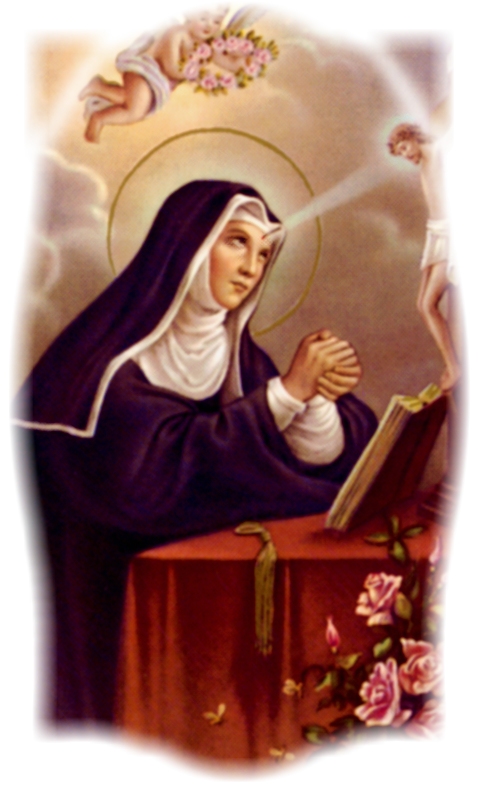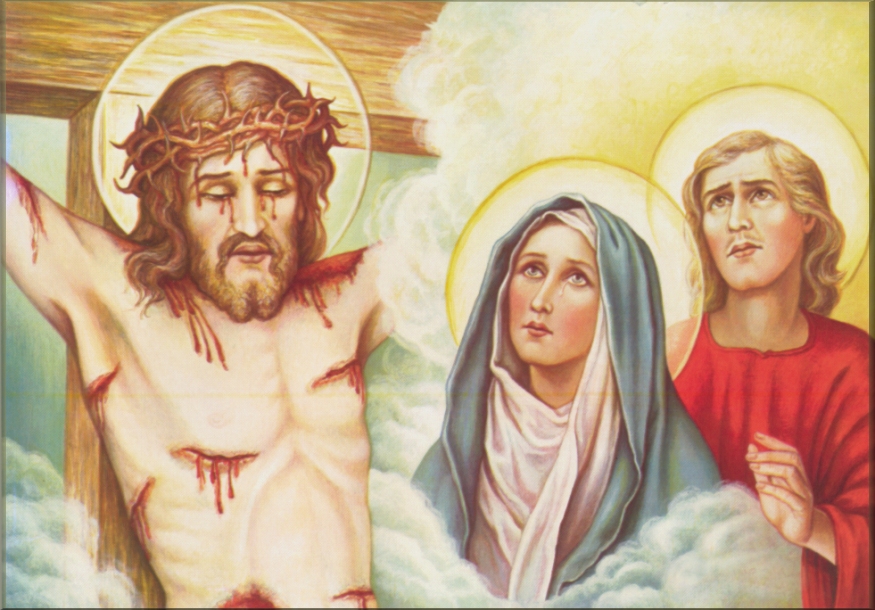
KNOWING THAT prayer is both a spiritual
nourishment of the soul and a celestial dew that fertilizes and
prepares
the soul to produce an abundant harvest of virtues, St. Rita became
full
of ardent desires to taste of this sacred nectar, so that she might
satisfy
that burning thirst she suffered, when she had become hydropical, so to
speak, with the love of her Divine Spouse, Jesus Christ. And coveting
to
drink of the bitter waters of His Passion, like St. Augustine, her
spiritual
father and ours, St. Rita considered Jesus Christ a sweet honeycomb,
distributing
sweet and delicious honey to all who seek Him and follow Him on the
bitter
way of the Cross. She contemplated Jesus Christ, as the Royal Prophet
had  foretold, encircled
by His executioners, who, like bees, surrounded
Him,
in order that through Him she might partake of the honey of Redemption.
She looked upon Jesus Christ as the miraculous dew that had fallen on
the
fleece, in the time of Gideon, and considered it a foreshadow of His
most
holy Incarnation, and considered, as did St. Chrysologus, that Jesus
Christ
was tormented on the Cross and His side pierced with a lance, so that a
copious rain of blood and water might fall upon and sanctify a world of
souls. And finally, keeping before her eyes the mysterious ladder she
had
seen in a vision, she considered it a figure of the Cross raised on
Calvary,
and actually desired to take upon her shoulders the Cross, so that she
might feel at least some of the torments of the Passion of her
crucified
Lord. The Lord heard the fervent prayers and anxious desire of St.
Rita,
and looking with favor on His faithful bride, He designed to answer her
prayers and granted her desire in a most miraculous manner.
foretold, encircled
by His executioners, who, like bees, surrounded
Him,
in order that through Him she might partake of the honey of Redemption.
She looked upon Jesus Christ as the miraculous dew that had fallen on
the
fleece, in the time of Gideon, and considered it a foreshadow of His
most
holy Incarnation, and considered, as did St. Chrysologus, that Jesus
Christ
was tormented on the Cross and His side pierced with a lance, so that a
copious rain of blood and water might fall upon and sanctify a world of
souls. And finally, keeping before her eyes the mysterious ladder she
had
seen in a vision, she considered it a figure of the Cross raised on
Calvary,
and actually desired to take upon her shoulders the Cross, so that she
might feel at least some of the torments of the Passion of her
crucified
Lord. The Lord heard the fervent prayers and anxious desire of St.
Rita,
and looking with favor on His faithful bride, He designed to answer her
prayers and granted her desire in a most miraculous manner.
When St. Rita had concluded her prayerful petition, her Divine Spouse, not wishing to resist any longer the desire of His faithful bride, granted her request. Making of His crown of thorns, so to speak, a bow, and of one of the thorns, an arrow, Jesus fired it at the forehead of St. Rita with such impetus and force that it penetrated the flesh and bone, and remained fixed in the middle of the forehead, leaving a wound that lasted all of her life----and even to this day, the scar of the wound remains plainly visible. The pain that followed, when the thorn penetrated the forehead of St. Rita, was so acute and intense that she fell into a swoon, and she would have died then and there had not Jesus, who wounded her, preserved her life, so that she might feel, as she had earnestly desired, at least a part of the pains and torments of His Passion. On recovering herself and knowing that she had been favored with a signal and precious token, St. Rita returned fervent and heartfelt thanks to her Divine Lover and Spouse.
St. Rita left the oratory bearing on her forehead the sacred wound, and on her countenance evident signs of intense suffering. On seeing the wound, the nuns were more than surprised, but they were ignorant of the mystery. St. Rita, however, guardian of the royal secret and knowing how important it was to conceal the sacrament the Sovereign King had confided to her, hid it in her bosom and revealed it to no one.
The pain caused by the wound increased day by day, and the wound itself assumed so ugly and revolting an appearance that St. Rita became an object of nausea to some of the nuns, who could not bear even to look at her. Not wishing to be the cause of the least inconvenience to the nuns, St. Rita remained nearly all the time in her cell engaged in Divine contemplation, and glorying, even in the midst of the pains of the wound caused by an arrow of Divine love. Sometimes the nuns visited her in her cell, either to bring her some nourishment or to speak a few words with her, for they all loved her dearly; And as often as they came, they departed edified by her wonderful patience.
But St. Rita was happy, even in the midst of her
sufferings, and when she felt that her sufferings were becoming more
intense,
she said to her Divine Spouse: "O loving Jesus, increase my patience
according
as my sufferings increase." This prayer, like all the prayers of St.
Rita,
was answered, and so great was her patience amidst all the pain she
suffered
that she called the little worms which were generated by the putrid
humor
of her wound, "her angels"-----for
they increased her sufferings whenever they moved or fed themselves on
her tender and aching flesh, thus giving her new occasions to practice
patience and to merit more and more the love and esteem of her Divine
Spouse,
Jesus Christ.
EFFICACY OF HER PRAYERS
BORN OUT of time, we may say, and really a gift of God to her aged parents in answer to their prayers, St. Rita began to pray in her earliest years. Sitting on the lap of her mother, she learned to pronounce the names of Jesus and Mary, and kneeling at her mother's knees, she learned the "Our Father," the "Hail Mary" and the "Credo" that is the "Apostles' Creed." As St. Rita grew in years, her love for prayer grew more and more ardent, and we can safely say that every day and many times a day during the years she remained in the world, the sweet voice of her prayers ascended to Heaven and charmed and captivated the ears and the heart of God.
But prayerful as St. Rita had been while in the world, it was when she left the world that she became the very soul of prayer, and gave herself up to the contemplation and meditation of the Divine mysteries of our holy faith. And because she desired to get closer and closer to her Divine Spouse, like Mary Magdalen she spent hours at the feet of Jesus, absorbing the spiritual delights and graces which fell like Heavenly dew on her pure and innocent soul. While meditating on the mystery of the Incarnation, astonished at the great humility of Jesus Christ in becoming man, St. Rita often said to herself: "Why art thou proud, O dust and ashes? Dost thou forget that a God humiliated and annihilated Himself, stooping from Heaven to lift you thither?"
The favorite meditation of St. Rita was the Passion of Jesus Christ, and she had so much compassion for the sufferings of her sweet Jesus that whenever she fixed her gaze on a Crucifix, tears came into her eyes. When not otherwise engaged, St. Rita could be found either in the chapel kneeling before the crucifix or in her little cell, where, as a memorial of the Passion, she had a few pictures attached to the wall representing some scenes of the Sorrowful Way of the Cross.
One of these pictures represented Mount Calvary.

It is related of St. Rita that on one occasion,
while meditating before this picture, she was rapt in ecstasy; and
remained
so long unconscious to everyone and everything around her that the
nuns,
when they discovered her, believed the soul of their holy and beloved
companion
had gone to a better and a happier life. St. Rita spent a good part of
the day, and many hours of the night, engaged in contemplation and
meditation,
and many a time did she feel a little displeased when the rising sun
surprised
her at meditation which she had begun at midnight, and she would say:
"Why
do you come so quickly? Do you wish to deprive me, with your small
light,
of the delights my soul is enjoying? Let me pray, O sun! Let me
meditate.
My soul sees more when it contemplates under the shadows of the night,
than my eyes do when aided by your splendor."
Besides meditating on the mysteries of our holy faith, St. Rita spent two hours each day petitioning Heaven for favors and graces for her own soul and the spiritual and temporal good of her neighbor. She prayed to the Eternal Father and asked Him pardon for her sins, by virtue of that extreme love that prompted Him to deliver up to death His only Son, whose death delivered sinners from the death of sin. She prayed to the Son of God and asked Him to enlighten her understanding, so that her heart might never stray away from Him who is the way, and the truth, and the life. She prayed to the Holy Ghost, whom she considered an ocean of love, and implored Him to cultivate her soul with the dew of His love, so that her heart might become a nursery of both His fruits and His gifts. She also prayed to the Blessed Virgin and sought some of her super-abundant humility; to the Angels for purity; and to all the Saints, for a participation in the virtues they practiced in this world. By means of her continual and fervent prayers, St. Rita obtained many singular favors and graces from Heaven, not only for herself, but also for her neighbor, for so efficacious were her prayers that she obtained from God whatever she asked.
We will cite two remarkable favors that were the results of St. Rita's fervent prayers and powerful intercession. A young child, the daughter of a woman of Cascia, was sick unto death. The attending physician, and another who was called in consultation, confessed that medical science could not save the child's life. The poor mother, overcome with grief, hastened to the Maddalena Convent, and earnestly besought St. Rita to ask God to spare the life of her only child. Moved by pity, St. Rita spoke kindly to the sorrowful mother, and consoled her by saying: "My good woman, have faith. God is good. Your child will not die. You will find her well when you return home." As soon as the woman had left her presence, St. Rita hastened to the chapel, and asked God to spare the life of the dying child. Her prayer was heard and answered immediately, and to the great joy of the afflicted mother, on her return home she found her young daughter cured of her illness.The following is another proof of the intercessory power of St. Rita's prayers. On one occasion there was brought to St. Rita a woman who for many years was possessed of an evil spirit that tormented and maltreated her most cruelly. St. Rita lost no time in showing her power over the infernal spirit. Raising her eyes to Heaven, she offered a prayer. Then she made the Sign of the Cross on the head of the possessed and she was liberated at once from the power of the evil tormentor who, when leaving the body of the woman, uttered a loud and frightful shriek.
The power of St. Rita over the infernal spirits manifested itself many times, and especially while she was engaged in prayer and meditation. Time and again did the devil try to disturb her while she was at meditation, trying to frighten her with loud howls and shrieks, and even appearing to her under the most hideous of forms. But St. Rita feared him not. She always drove him away with the Sign of the Cross, and continued her meditation or prayers as if nothing had happened to disturb her.
St. Rita was also an example of prayer to her holy companions of the Maddalena, and very frequently did she urge them to obey faithfully the command of Jesus Christ: Watch and pray, saying to them: "My beloved sisters: since we offend our sweet Jesus, every day, in thought, word, deed and the omission of good works, we should pray every day, and every hour of the day, and weep for our offenses against so kind and loving a Father, Master and Spouse."
HOME--------------PRAYER INDEX
www.catholictradition.org/Cascia/rita3-2.htm
